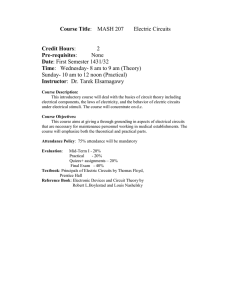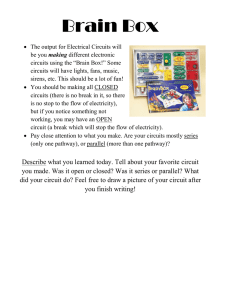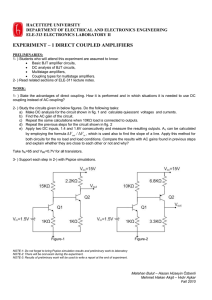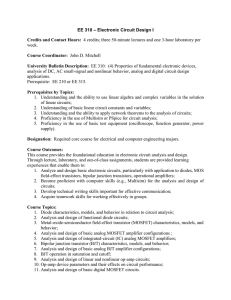Engineering Sciences 154 Electronic Devices and Circuits
advertisement
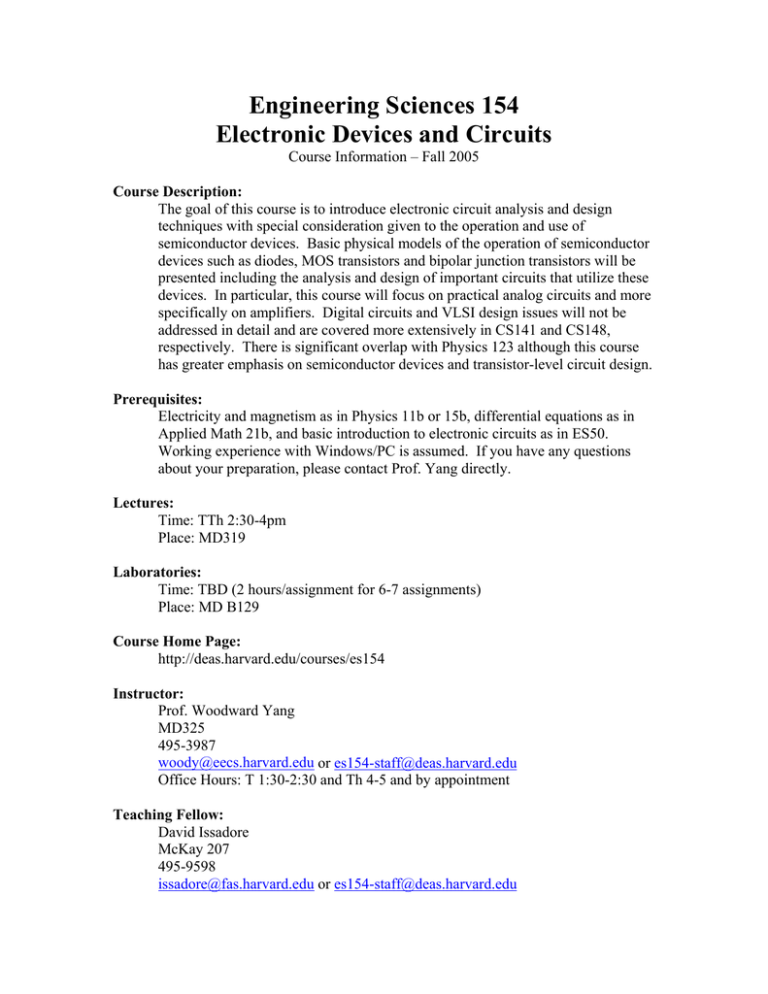
Engineering Sciences 154 Electronic Devices and Circuits Course Information – Fall 2005 Course Description: The goal of this course is to introduce electronic circuit analysis and design techniques with special consideration given to the operation and use of semiconductor devices. Basic physical models of the operation of semiconductor devices such as diodes, MOS transistors and bipolar junction transistors will be presented including the analysis and design of important circuits that utilize these devices. In particular, this course will focus on practical analog circuits and more specifically on amplifiers. Digital circuits and VLSI design issues will not be addressed in detail and are covered more extensively in CS141 and CS148, respectively. There is significant overlap with Physics 123 although this course has greater emphasis on semiconductor devices and transistor-level circuit design. Prerequisites: Electricity and magnetism as in Physics 11b or 15b, differential equations as in Applied Math 21b, and basic introduction to electronic circuits as in ES50. Working experience with Windows/PC is assumed. If you have any questions about your preparation, please contact Prof. Yang directly. Lectures: Time: TTh 2:30-4pm Place: MD319 Laboratories: Time: TBD (2 hours/assignment for 6-7 assignments) Place: MD B129 Course Home Page: http://deas.harvard.edu/courses/es154 Instructor: Prof. Woodward Yang MD325 495-3987 woody@eecs.harvard.edu or es154-staff@deas.harvard.edu Office Hours: T 1:30-2:30 and Th 4-5 and by appointment Teaching Fellow: David Issadore McKay 207 495-9598 issadore@fas.harvard.edu or es154-staff@deas.harvard.edu Laboratory Assistant: Xuan Liang Pierce G11A 495-2870 xuan@kepler.harvard.edu or es154-staff@deas.harvard.edu Administrative Assistant: MaryFran Mitrano MD143 496-8360 maryfran@deas.harvard.edu Required Text: Microelectronic Circuits, Sedra and Smith, 5th Edition, Oxford ISBN 0-19-514251-9 (should be available at the Harvard Coop) Lecture Notes and Additional Handouts will be provided in class. Recommended References: Elementary Linear Circuit Analysis, Bobrow, 2nd Edition, HRW Electrical Engineering, Schwarz and Oldham, 2nd Edition, Oxford Electric Circuits, Nilsson, 4th Edition, Addison-Wesley Engineering Circuit Analysis, Hayt and Kemmerly, 5th Edition, McGraw-Hill Introduction to Electric Circuits, Dorf, 2nd Edition, John Wiley Fundamentals of Electronic Circuit Design, Comer and Comer, John Wiley Design of Analog CMOS Integrated Circuits, Razavi Analysis and Design of Analog Integrated Circuits, Gray and Meyer, John Wiley The Design of CMOS RF Integrated Circuits, Lee, Cambridge CMOS Analog Circuit Design, Allen and Holberg, HRW Device Electronics for Integrated Circuits, Muller and Kamins, John Wiley Microelectronics, Howe and Sodini, Prentice Hall Solid-State Electronic Devices, Streetman, 3rd Edition, Prentice Hall The Art of Electronics, Horowitz and Hill Course Requirements: Lectures: While attendance at lecture is not required, it is strongly encourages. In addition, while some lecture note handouts will be provided, they are not complete nor guaranteed to be correct nor a substitute for attending lecture. Problem Sets: Weekly problem sets will be typically assigned on Tuesday and will be due one week later on Tuesday before the start of lecture. Late homework will receive a maximum of ½ credit. Homework more than one week late will receive no credit; see me for exceptional cases. Homework will make up a significant part of your grade, and it is important that you do your assignments carefully and hand them in promptly. Laboratories: There will be about 6-7 laboratory assignments throughout the semester. Experimental labs will bin MD B219 during assigned hours that will be announced later. Midterm Exam: There will be one 90 minute midterm examination that is tentatively scheduled for Thursday, November 17. Final Exam: A regular 3 hour final examination is scheduled for January 17 or 19 to be determined by the Registrar. Design Project: There will be a design project assigned near the end of the semester. A write-up of the project will be due at the end of reading period. Course Grading: Your final course grade will be roughly based on the following weighting of your course work. Adjustments may be made on a case by case basis. Problem Sets: 30% Laboratories: 15% Design Project: 10% Midterm Exam: 10% Final Exam: 35% The course is typically curved around a B/B- average. However, if the class average for total points is higher than this absolute average, we will (happily) raise the average letter grade. Policy on Cooperation: Please feel free to talk with other class members and the teaching staff about the problems sets and laboratory assignments, but always turn in only your own work. The midterm and final exams are open book, but they are not open neighbor. It is in your best interest to understand the problem sets and the laboratories. Tentative Course Schedule week 9/19 9/26 10/3 Lecture Topics Laboratory course overview, circuit elements, DC circuit analysis, 1st order circuit transient analysis 2nd order circuit, AC circuit analysis, impedance, frequency response, bode plot intro to semiconductors, pn junction operation Lab #1: Oscilloscope Lab #2: Op Amp 10/31 diode modeling and circuits, MOSFET device operation, MOSFET biasing and modeling MOSFET circuits BJT device operation, BJT biasing and modeling BJT circuits, intro to integrated circuits 11/7 current mirrors, integrated MOSFET amplifier Lab #5: Amplifier Design and Test 11/14 integrated BJT amplifiers, single ended amplifiers review midterm solutions Midterm Exam 10/10 10/17 10/24 11/21 12/12 single-ended amplifiers at high frequency, OCT analysis differential pair, high gain differential amplifier op amp design example 12/19 feedback amplifiers and stabilty 11/28 12/5 Lab #3: Diode Circuits Lab #4: SPICE Circuit Simulator Thanksgiving Holiday Lab #6: Current Mirrors Begin Design Project
